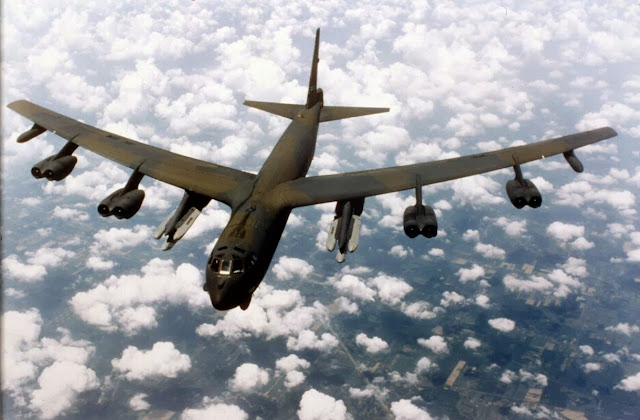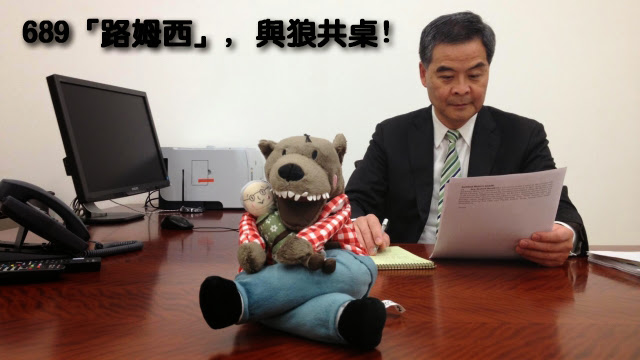最新型的 B-52H 空中堡壘美國現存 95架,中國設立防空識別區,美國就高調派了兩架飛來,並且來回飛航兜了幾圈。
B-52 Stratofortress Bomber 的研發過程
B-52 同溫層空中堡壘戰略轟炸機 Stratofortress Bomber,是美國為了對抗當年蘇俄而建造的轟炸機,美蘇兩國爭霸三十多年冷戰二十多年,美國靠借去維持軍力,國債升至十七萬億(Ceiling 永遠可以不斷加),國債債台高築美國在所不計,但也同時拖垮了蘇聯。
蘇聯解體後的剩下俄國,俄國國內重新執過位,沒時間與美國全球性紏纏,剛巧中國在亞洲崛起,美國就把中國妖魔化,成為美軍敵對假想敵,美國繼續 舉債 維持超級軍力做惡霸,更把爭霸焦點轉到來東亞。
八個引擎的 B-52 戰略轟炸機
【維基百科】The Boeing B-52 Stratofortress is a long-range, subsonic, jet-powered strategic bomber. The B-52 was designed and built by Boeing, which has continued to provide support and upgrades. It has been operated by the United States Air Force (USAF) since the 1950s. The bomber is capable of carrying up to 70,000 pounds (32,000 kg) of weapons.
Beginning with the successful contract bid in June 1946, the B-52 design evolved from a straight-wing aircraft powered by six turboprop engines to the final prototype YB-52 with eight turbojet engines and swept wings. The B-52 took its maiden flight in April 1952. Built to carry nuclear weapons for Cold War-era deterrence missions, the B-52 Stratofortress replaced the Convair B-36. A veteran of several wars, the B-52 has dropped only conventional munitions in combat. The B-52's official name Stratofortress is rarely used in informal circumstances, and it has become common to refer to the aircraft as the BUFF (Big Ugly Fat Fucker).
可以在五萬呎高空狂轟猛炸快過疴蛋 B-52 的炸彈如雨下作地氈式轟炸
【維基百科】The B-52 has been in active service with the USAF since 1955. As of 2012, 85 were in active service with nine in reserve. The bombers flew under the Strategic Air Command (SAC) until it was inactivated in 1992 and its aircraft absorbed into the Air Combat Command (ACC); in 2010 all B-52 Stratofortresses were transferred from the ACC to the new Air Force Global Strike Command (AFGSC).
Superior performance at high subsonic speeds and relatively low operating costs have kept the B-52 in service despite the advent of later aircraft, including the canceled Mach 3 B-70 Valkyrie, the variable-geometry B-1 Lancer, and the stealth B-2 Spirit. The B-52 completed fifty years of continuous service with its original operator in 2005; after being upgraded between 2013 and 2015, it is expected to serve into the 2040s.
空中加油加強續航力
【維基百科】The B-52 shared many technological similarities with the preceding Boeing B-47 Stratojet strategic bomber. The two aircraft utilized the same basic design, such as swept wings and podded jet engines, and the cabin included the crew ejection systems. On the B-52D, the pilots and electronic countermeasures (EDM) operator ejected upwards, while the lower deck crew ejected downwards; until the B-52G, the gunner had to jettison the tail gun to bail-out.
The ability to carry up to 20 AGM-69 SRAM nuclear missiles was added to G and H models, starting in 1971. To further improve the B-52's offensive ability, air-launched cruise missiles (ALCMs) were fitted.
After testing of both the air force-backed Boeing AGM-86 and the navy-backed General Dynamics AGM-109 Tomahawk, the AGM-86B was selected for operation by the B-52 (and ultimately by the B-1 Lancer). A total of 194 B-52Gs and Hs were modified to carry AGM-86s, carrying 12 missiles on underwing pylons, with 82 B-52Hs further modified to carry another eight missiles on a rotary launcher fitted in the aircraft's bomb-bay.
To conform with SALT II Treaty requirements that cruise missile-capable aircraft be readily identifiable by reconnaissance satellites, the cruise missile armed B-52Gs were modified with a distinctive wing root fairing. As all B-52Hs were assumed modified, no visual modification of these aircraft was required.
In 1990, the stealthy AGM-129 ACM cruise missile entered service; although intended to replace the AGM-86, a high cost and the Cold War's end led to only 450 being produced; unlike the AGM-86, no conventional (non-nuclear) version was built. The B-52 was to have been modified to utilize Northrop Grumman's AGM-137 TSSAM weapon; however, the missile was canceled due to development costs.
Show off 演嘢
【維基百科】Those B-52Gs not converted as cruise missile carriers underwent a series of modifications to improve conventional bombing. They were fitted with a new Integrated Conventional Stores Management System (ICSMS) and new underwing pylons that could hold larger bombs or other stores than could the external pylons. Thirty B-52s were further modified to carry up to 12 AGM-84 Harpoon anti-ship missiles each, while 12 B-52Gs were fitted to carry the AGM-142 Have Nap stand-off air-to-ground missile.[97] When the B-52G was retired in 1994, an urgent scheme was launched to restore an interim Harpoon and Have Nap capability, the four aircraft being modified to carry Harpoon and four to carry Have Nap under the Rapid Eight program.
The Conventional Enhancement Modification (CEM) program gave the B-52H a more comprehensive conventional weapons capability, adding the modified underwing weapon pylons used by conventional-armed B-52Gs, Harpoon and Have Nap, and the capability to carry new-generation weapons including the Joint Direct Attack Munition and Wind Corrected Munitions Dispenser guided bombs, the AGM-154 glide bomb and the AGM-158 JASSM missile. The CEM program also introduced new radios, integrated Global Positioning System into the aircraft's navigation system and replaced the under-nose FLIR with a more modern unit. Forty-seven B-52Hs were modified under the CEM program by 1996, with 19 more by the end of 1999.
B-52 經改裝後機腹內可以攜帶新的一代武器 智能炸彈 巡航導彈
【維基百科】Starting in 2016, Boeing is to upgrade the internal rotatory launchers to the MIL-STD-1760 interface to enable the internal carriage of smart bombs, which can currently only be carried on the wings.
For a study for the U.S. Air Force in the mid-1970s, Boeing investigated replacing the engines, changing to a new wing, and other improvements to upgrade B-52G/H aircraft as an alternative to the B-1A, then in development. Boeing later suggested re-engining the B-52H fleet with the Rolls-Royce RB211 535E-4.
This would involve replacing the eight Pratt & Whitney TF33s (total thrust 8 × 17,000 lb) with four RB211s (total thrust 4 × 37,400 lb)— which would increase range and reduce fuel consumption, at a cost of approximately US$2.56 billion for the whole fleet (71 aircraft at $36 million each).
A Government Accountability Office study concluded that Boeing's estimated savings of US$4.7 billion would not be realized and that it would cost US$1.3 billion over keeping the existing engines; citing significant up-front procurement and re-tooling expenditure, and the RB211's higher maintenance cost. The GAO report was subsequently disputed in a Defense Sciences Board report in 2003; the Air Force was urged to re-engine the aircraft without delay.
舊款的 B-52 機隊停放在 阿里桑拿州的露天停機坪
【維基百科】Further, the DSB report stated the program would have significant savings, reduce greenhouse gas emissions, and increase aircraft range and endurance; in line with the conclusions of a separate Congress-funded study conducted in 2003. The re-engining has not been approved as of 2013.

B-52 與 隱形戰機 B-1 共飛都毫不輸蝕
其實多年來 B-52 不斷改進計有:X/YB-52,B-52A,B-52B,B-52C,B-52D,B-52E,B-52F,B-52G,和 B-52H 等等不同型號。
最新款的 B-52H
【維基百科】The B-52H had the same crew and structural changes as the B-52G. The most significant upgrade was the switch to TF33-P-3 turbofan engines which, despite the initial reliability problems (corrected by 1964 under the Hot Fan program), offered considerably better performance and fuel economy than the J57 turbojets.
The ECM and avionics were updated, a new fire control system was fitted, and the rear defensive armament was changed from machine guns to a 20 mm M61 Vulcan cannon (later removed in 1991–94). A provision was made for four GAM-87 Skybolt ballistic missiles. The aircraft's first flight occurred on 10 July 1960, and it entered service on 9 May 1961. This is the only variant still operational. A total of 744 B-52s were built. The last production aircraft, B-52H AF Serial No. 61-0040, left the factory on 26 October 1962.
General characteristics
Crew: 5 (pilot, copilot, radar navigator (bombardier), navigator, and Electronic Warfare Officer)
Length: 159 ft 4 in (48.5 m)
Wingspan: 185 ft 0 in (56.4 m)
Height: 40 ft 8 in (12.4 m)
Wing area: 4,000 sq ft (370 m²)
Airfoil: NACA 63A219.3 mod root, NACA 65A209.5 tip
Empty weight: 185,000 lb (83,250 kg)
Loaded weight: 265,000 lb (120,000 kg)
Max. takeoff weight: 488,000 lb (220,000 kg)
Powerplant: 8 × Pratt & Whitney TF33-P-3/103 turbofans, 17,000 lbf (76 kN) each
Fuel capacity: 47,975 U.S. gal (39,948 imp gal; 181,610 L)
Zero-lift drag coefficient: 0.0119 (estimated)
Drag area: 47.60 sq ft (4.42 m²)
B-52 戰略轟炸機 H-型號
Maximum speed: 560 kt (650 mph, 1,047 km/h)
Cruise speed: 442 kt (525 mph, 844 km/h)
Combat radius: 4,480 mi (3,890 nmi, 7,210 km)
Ferry range: 10,145 mi(8,764 nmi, 16,232 km)
Service ceiling: 50,000 ft (15,000 m)
Rate of climb: 6,270 ft/min (31.85 m/s)
Wing loading: 120 lb/ft² (586 kg/m²)
Thrust/weight: 0.31
Lift-to-drag ratio: 21.5
Guns: 1× 20 mm (0.787 in) M61 Vulcan cannon originally mounted in a remote controlled tail turret on the H-model, removed from all current operational aircraft in 1991
Bombs: Approximately 70,000 lb (31,500 kg) mixed ordnance; bombs, mines, missiles, in various configurations.
美國本土的飛機發燒友拍到的 B-52H
【維基百科】B-52H 現存 95架的最新型,結構與組員組成與 B-52G相同,但將 J-57更換為 TF-33渦扇引擎,新的引擎不但可以提供更大的推力,並且較 J-57更為省油。是故換裝新引擎的 B-52H航程加大15%。
另外加配防電戰系統和自衞防禦系統,還有衞星連結能力可以攜帶幾乎所有美軍彈械,2006年通過驗證可以使用合成燃油減低燃料成本,此為全球軍機首創。
The only active operational model of the B-52 is the B-52H. It is currently stationed at two USAF bases, flown by three wings:
2d Bomb Wing - Barksdale AFB, Louisiana
11th Bomb Squadron (B-52H, Tail Code: LA, Gold Tail Stripe)
20th Bomb Squadron (B-52H, Tail Code: LA, Blue Tail Stripe)
96th Bomb Squadron (B-52H, Tail Code: LA, Red Tail Stripe)
5th Bomb Wing - Minot AFB, North Dakota **
23d Bomb Squadron (B-52H, Tail Code: MT, Red Tail Stripe)
69th Bomb Squadron (B-52H, Tail Code: MT, Black Tail Stripe)
307th Bomb Wing (AFRES) - Barksdale AFB, Louisiana
93d Bomb Squadron (B-52H, Tail Code: BD, Blue/Gold Chex Tail Stripe))
343d Bomb Squadron
**
2004年美空軍第 5轟炸聯隊的首批 B-52轟炸機,從北達科塔州前移至,位于日本關島的安德森空軍基地。第 5空軍轟炸聯隊指揮官稱,將有 6架 B-52H 轟炸機和大約 300名空軍官兵被派駐安德森空軍基地,每 3個月後輪換(嗜悲 加註:在關島還有 B-2 隱形轟炸機)。
2013年中國訂立東海防空識別區,其實日本早於 44年前,也是從未曾諮詢中國,就經已單方面設立防空識別區,並伸延至離中國沿海海岸線僅僅 130海哩,日方今次卻惡人先告狀,說中國未經諮詢日方不予承認,至於一向偏袒日方的美國,就高調派出兩架 B-52H來華尋釁滋事。
日本政壇 安倍晉三 的自民黨,在十二月做了很多的大動作,直程就是挑戰中國的底線到底有幾低,見中國唔想打熱戰,就繼續更變本加厲刺激中國,無他為了撩仗打可以去得好盡。前些時的國有化釣魚台列島是陽謀,最近的計有:拉攏東盟圍堵中國(擴大中國威脅論),向在蘇丹的韓國維和部隊送子彈(突破禁止輸出武器),通過《特定秘密保護法》(以保密為由矇騙國民實行黑箱作業),安倍親自參拜靖國神社(明目張膽歌頌崇拜軍國主義)。。。。。美國作出小責罵卻實在是大幫忙,有誰保證和相信沒有美國在幕後擺佈,臨近歲末還漏出美國對台灣售武,輸出魚叉導彈專門針對中國航母!
2014年是清日甲午戰爭的 120週年,1894年(清光绪二十年,日本明治二十七年)清日在黃海爆發海戰,清北洋艦隊不堪一擊清朝戰敗。 120年後中日在東海的對峙,加上美國的刻意偏袒,2014年將會是凶險的一年 。。。。。。。。。解放軍以往打過的都是陸地上人海戰術,海面、海面上空、和海面底下的高級科技戰,只有理論沒有一丁點半點實戰經驗,若習近平等沉不著氣,或是壓不著鷹派解放軍求戰,大家等著朝 120年後亦終於難逃一敗再敗!
增記:
120年後的 2014年,美國這隻 ”無形之手“ 無時無刻 Unintentional to play a part 的幕後黑手,繼續在全球指指點點,如今更把第二次大戰發動太平洋戰爭的死敵,偷襲珍珠港的日本人擁抱,並推出來當爛頭卒,劍指當年的盟友中國。
《明報 12月 22日 社評》:安倍國防外交瞄準中國 幕後玩家美國若隱若現
【明報專訊】最近 10天(按 12月 22日計),日本首相安倍晉三在外交和國防兩條戰線動作頻仍,連串都是衝着中國而來,先是日本與東盟在東京舉行峰會,發表聯合聲明「確保飛行自由」,雖然聲明沒有提到中國最近的東海防空識別區,但針對中國已是不言而喻。
另一就是安倍內閣通過「國家安全保障戰略」,提出三個方向,包括加強與東盟及韓國、澳洲的戰略合作關係,以至有意修改一直是禁區的武器出口政策,做法兼具圍堵及備戰意味。
連串外交角力 美日東盟聯線
東海防空識別區在美日兩國多番表示不滿之下成立快一個月,至今客觀上既成事實,北京不可能收回,美日心裏也會作如是觀。下一個針鋒相對的戰場,是形勢更加複雜的南海,這裏有馬六甲海峽,是日本和韓國的海上生命線,附近一帶更是美國自從二戰以來70年的禁臠,以美國的說法是「保障航行安全」。美國副總統拜登早前訪華,長時間的會談,重點在於表達美國不欲中國在南海也有類似的防空識別區。
若是人們把這一連串外交角力接連來看,便很清楚看出之間有着極其緊密的聯繫<-->美國呼籲中國不要在南海空域設識別區,日本與南海之內的東盟發表確保飛行自由的聲明,之後是日本國家安全保障戰略把目標放在東盟<-->日本的動作隨着美國指揮棒變化調整,予人互相配合的觀感:美國身影若隱若現,既要牽制中國,但又不欲令中國感到美國在為日本撐腰,這種掩耳盜鈴做法不見得高明,尤其是在日本的野心愈來愈大的當下。
儘管有說東盟在峰會上只答應發表沒有提到中國的確保飛行自由聲明,有着不欲事情鬧大至組成日本<-->東盟聯盟對付中國的潛台詞,這種說法其實未必盡然。東盟 1960年代成立時就是冷戰包夾中國及蘇聯的產物,美國對東盟的影響力從未消減,東盟不願公開點中國的名,只是冀圖兩邊得利。
但客觀闡明他們仍然願意站在美國和日本的保護傘底下,菲律賓人質事件至今天菲方仍未願意正式道歉,若是說中間沒有美國撐腰對付中國的因素,恐怕難以說得通。東盟其他一些國家本來就與中國有南海主權糾紛如越南,也是因着同樣原因到東京參加峰會。
日本要組建東盟統一戰線,就必須有所表示,這在安倍內閣的國家安全保障戰略可以看到。這份3個部分的戰略大綱,除了日本建構奪島部隊以及斥巨資購買更多美國軍事裝備,其中有一條是日本可能修改以往禁止輸出武器的3原則。這一點是整份大綱的核心。
這是日本遵守超過 40年的原則,1967年,時任首相佐藤榮作提出武器出口的「三不」:不向共產國家出口、不向被聯合國禁運武器國家出口、不向發生國際爭端或可能發生國際爭端的國家出口。前兩條已無甚意義,在第三條,菲律賓和越南都適用,事實上目前也是這兩個國家在南海主權糾紛上與中國齟齬最多,日本一旦武器出口、而且若是去這兩個國家,就必須如大綱所說那樣要「修改3原則」了。
修改武器出口原則 日本利誘東盟諸國
對外國出售武器絕對不是單單是一盤生意而是深遠的戰略考慮,即從表面來說,是把購武國視為盟友而非敵人。日本的電子科技精良,美國導彈系統不乏日本元件。
再說,日本海上軍力有其長久傳統,軍事專家把日本海上自衛隊實力列為僅次於美國的世界第二強,其獵潛實力更是世界之冠,爭逐南海,不論中美日抑或菲越等國,都把提升海上軍力視為頭號大事,若日本可以出售軍艦等設施,美<-->日<-->東盟的關係就會更呈緊密,換言之,共同抗中的實力會有所增強。安倍內閣的計算極可能是以精良的軍事產品,換來同盟關係。
中日之間的關係已然進入磨拳擦掌的狀態,遠比當年參拜靖國神社的小泉純一郎年代緊張。從目前的情况來看,中日不可能在中短期內修好,就是安倍晉三下台,新任首相也不可能一下子扭轉局面。
中國對兩國關係好轉所抱的期許正在高速收縮,儘管戰爭全面爆發的可能此刻仍不算太高,然而 1980年代中日友好時期「日中不再戰」的善頌善禱已無大意義,尤其這不僅是中日紛爭,更重要的是,美國的黑影正把這種關係推向難以修補的地步。
中國若戰必受美日東盟三方夾擊,俄國必將效法韓戰越戰時蘇聯趁機攞著數,然而中國怎去平復國內主戰的軍方鷹派,和另一方面也要向國民交代,改革開放多年的成果,會否在 2014年一鋪清袋,看看中國人的彩數矣!
後記:
美國國防部長訪華,被邀請上 ”遼寧艦“後,再在北京被 習總 以柔制剛罵了一頓後。
美军驻冲绳最高司令官兼第三海军远征军司令惠斯勒:美军不用登陆就可消灭登钓鱼岛解放军
【新浪網】美军驻冲绳最高司令官兼第三海军远征军司令惠斯勒表示,假如中国军队武装“占领了钓鱼岛”的话,美国海军陆战队甚至不用登岛,就有充分的能力夺回岛屿。这是美军高级司令官首次在公开场合表明美军将会在中国军队攻占尖阁列岛之后,会采取直接介入的军事行动,帮助日本夺回这一岛屿。
这是惠斯勒司令官在11日于华盛顿举行的记者恳谈会上作出上述表示的。他说:“如果(美国政府)下达夺回尖阁列岛命令的话,我们将能迅速执行这一任务。”他同时指出:“钓鱼岛是由一群极其狭小的的岛屿组成,也许不需要派兵员登陆就可以扫除威胁。”表明不需要派出海军陆战队,只需要从海空实施攻击,就可以消灭中国军队。
惠斯勒司令官还表示,虽然日中双方都已经表现出了自制,但是现场发生判断错误引发武装冲突的可能性依然存在。
针对日本组建水陆机动团问题,惠斯勒司令官表示欢迎。他说,这不仅有利于在整个亚太地区的救灾作战,也会成为美国海军陆战队的强大的伙伴。
解放軍 中将批狂妄美军:我军若把钓鱼岛当靶场请有准备
【新浪網】近日,美军驻冲绳司令兼海军陆战队第三远征军司令威斯勒声称,“如果接到命令夺回钓鱼岛,我们能拿下吗?当然可以。
并且不需要登岛,只需海空进攻的方式即可消除威胁”。美军太平洋总部一个驻地区的指挥官如此越权发声、口出狂言,明确以中国人民解放军为敌,是近些年所没有的。美军驻冲绳司令的战争恐吓,是想吓住中国人民、政府和军队吗?期望值恐怕是高了。
与威斯勒同级别的我军指挥员,鉴于我军外事纪律,不便于直接回应威斯勒的挑衅言论。笔者作为一个已经退出指挥岗位的原战区指挥官,想对威斯勒表明以下态度:
第一,常万全部长在与贵国哈格尔防长的联合记者会中说,中国军队肩负着维护国家主权、安全和领土完整的使命,做好了应对各种威胁和挑战的准备,只要党和人民需要,就能召之即来,来之能战,战之必胜。所以,不论你如何叫嚣,在钓鱼岛问题上我国的政策方向不会变,我军作战方向和任务也不会变。
第二,钓鱼岛当面是我华东地区,在国防安全上由我南京战区管辖。在东海上与贵部“管辖”范围重叠。钓鱼岛距我岸不足 400千米,在军事地理上属于近海范畴。笔者可以负责任地告诉你,仅凭我战区武装力量,管控钓鱼岛还是绰绰有余的,我区战役火力能够覆盖钓鱼岛海域和空域。作为军人,我们都知道“护航”这个军语,过去的兵力护航,现在已经发展到火力护航。所以不要威胁在我钓鱼岛海域、空域执行任务的公务船、公务机。否则自身安全也会受到威胁。提醒你在动武前,好好研究一下兵力对比和战场环境,再搞一下兵棋推演或计算机仿真,看看胜算几何?否则可能收不了场。
第三,据说钓鱼岛曾作过驻日美军的航空兵靶场。我区航空兵和其他远射火力兵种,在这个距离上正好也缺这样的一个靶场。好处是我战区三军部署不需要前推,在原地只要调整射向,修订一下射击诸元和发射参数,即可使用。哪天我军宣布钓鱼岛为我战区靶场,你要有心理准备。
第四,请你明白,我军熟悉钓鱼岛的军事地理环境,如果成为战场,守军是没有任何生存条件的。所以我军对钓鱼岛的行动,与贵军“无需派兵登岛,即可消除威胁”的做法所见略同,还请你将这一做法转告日方,请勿妄动。借此还要提醒一下将军,你的部队部署是否过于靠前了?如果要确保贵军的安全距离,建议你们退到第二岛链之外,那里暂时还是安全的。
最后还要说明一点,笔者作为曾经的战区指挥官,本应与你的上级 —— 太平洋总部指挥官对话。当下与你对话,是对你的尊敬。笔者当年曾与你的老上级 —— 参联会主席佩斯和太平洋总部司令基廷,就中美两军感兴趣的话题单独聊过,并留下美好记忆。请你向你的老上级学习,不要动辄以武力相威胁,请对曾经在抗美援朝战争中打败过贵军的中国军队放尊重些。还要建议你好好学习历史,对当年的太平洋战争和中国的抗日战争认真补课,搞明白日本军国主义是什么东西。
《为梦想领跑》 六分四十二秒鐘宣傳片
論口水戰中國十三億人口的口水,一定浸死只得三億多人口的美國。但這是沒用的,硬得起來的才是 “真有撚用”!!!
伸延閱覽:
Boeing B-52 Stratofortress 同溫層堡壘轟炸機 維基百科
B-52 Stratofortress 同溫層堡壘轟炸機 基地和編隊 維基百科
黃海海戰 (1894年) 維基百科
台灣購入美軍魚叉反艦導彈 有線新聞
幕後玩家美國若隱若現 新浪新聞網
美军高官:美军不用登陆就可消灭登钓鱼岛解放军 新浪新聞網
解放軍中将批狂妄美军:我军若把钓鱼岛当靶场请有准备 新浪新聞網
我的舊文:
美國靠借延續霸權
霸權主義 11個航母戰闘群 耀武揚威
日本最新最大準航母 出雲號 下水
Unintentional to play a part
























